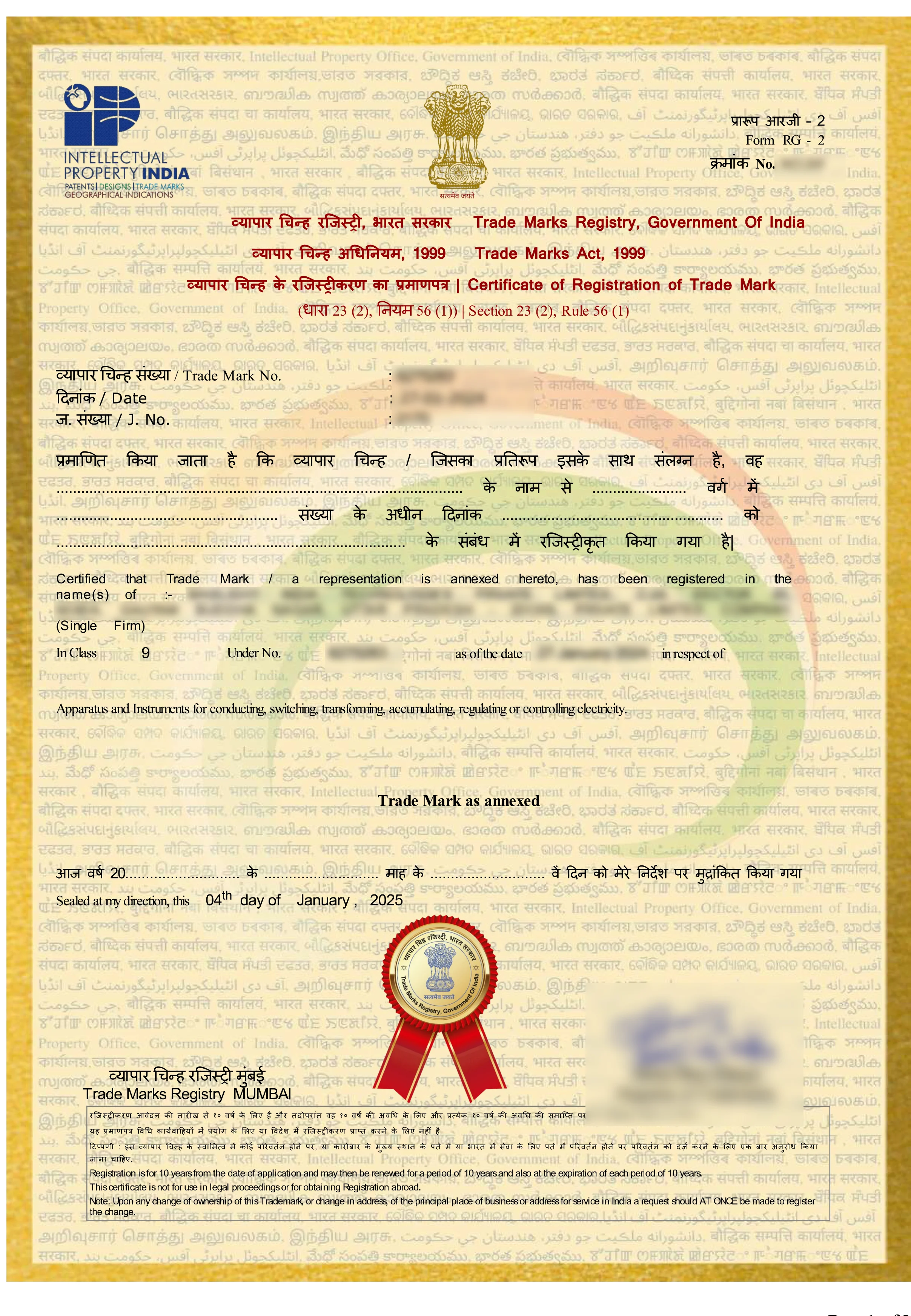
Get Instant Solution By an Expert Advisor
(4.8)
Ready to protect your brand in India? Here we have gotten you all the key information you need about trademark registration, including a detailed list of necessary documents, a step-by-step explanation of the whole process from application to approval, and a clear overview of all associated fees. For any confusion, you can Fill out the Enquiry Form or Call us Dirctly for Professional Assistance. Click here to view our in-depth resource and take the first important step towards securing the legal protection for your brand in the Indian market!


10000 +
Projects Completed for Our Respected Clients.
15 +
Years Experienced Advisors in Indian Compliance.
98.9%
Project Delivery Ratio for Our Valuable Clients.
99.9%
Satisfied Customers All Over India.
A trademark is a unique symbol, word, logo, phrase, or design that helps people identify a brand. It separates your brand from others while creating customer trust.
The ownership of a trademark registered in India allows the owner exclusive brand-mark use while protecting the owner from misappropriation and unauthorized duplicates. Trademarks help companies stop unauthorized competitors, strengthen their brand legitimacy, and expand business. A registered trademark is a valuable company asset because it makes a brand more recognizable in the market and boosts sales over time.

Businesses and products require unique symbols, words, or phrases which identify your brand or product. Customers use trademarks to differentiate between products or brands. A trademark consists of logos, slogans, colors, sounds, or a combination of these elements.
Registrating trademarks grants a company sole authority to use them. The brand receives active protection from any unauthorized usage. The process of trademark registration in India operates under the rules of the Trademark Act, of 1999. With trademarks, businesses get legal protection and increased brand value.
Businesses can register different types of trademarks. Each type serves a specific purpose and offers distinct protection.
Registering a trademark offers several advantages. It provides legal security, strengthens brand identity, and ensures long-term business growth. Below are the key benefits:
Before applying for a trademark, businesses must check if a similar mark already exists. A proper search helps avoid legal disputes and increases the chances of approval. The process involves:
Trademarks are classified based on business activity. India follows the NICE Classification, which includes 45 trademark classes.
| Trademark Class | Business Class |
| Class 1 - 34 | Goods |
| Class 35 - 45 | Services |
Each class represents a specific category. Businesses must apply under the relevant class to secure protection.
A trademark is essential for businesses, startups, and individuals. It helps in brand differentiation and legal security. Entities that require trademark registration include:
To register a trademark, applicants must meet certain criteria. The eligibility requirements include:
Proper documentation is very important for Trademark Registration in India. Submitting the correct documents ensures a smooth registration process and prevents unnecessary delays. The required documents vary based on the type of applicant, whether an individual, company, or partnership firm.
| Documents | Purpose | Who Needs It |
| Identity Proof | Verifies the applicant's identity | Individual applicants, business owners. |
| Address Proof | Confirms the registered address of the business. | All applicants. |
| Business Registration Certificate | Establishes the business as a legal entity. | Companies, partnership firms. |
| Logo or Wordmark | Identifies the unique brand symbol or name. | All applicants. |
| Power of Attorney | Authorizes an agent or lawyer to file on behalf. | If applying through an agent |
| User Affidavit | Confirms prior use of the trademark. | If the trademark is already in use before registration. |
The procedure for registration of a trademark follows several important steps. Each step ensures the trademark is unique, legally protected, and valid for use in India.
Step 1: Trademark Search - Before applying, a trademark search is conducted to check if the desired mark is already in use. This helps prevent legal disputes and rejections. The search can be done through the trademark registration check on the official IP India website.
Step 2: Filing the Application - If the mark is unique, the applicant must file Form TM-A with the required documents. The application should include the business details, logo, and trademark class. Government trademark registration fees depend on the business type.
Step 3: Application Examination - After submission, the Trademark Registry examines the application. The authorities check if the mark follows the legal rules and does not match existing trademarks. If there are any issues, the registry may issue an examination report, asking for clarifications or modifications.
Step 4: Publication in the Trademark Journal - Once cleared, the mark is published in the Trademark Journal for public viewing. This allows third parties to file objections within 4 months if they believe the mark is too similar to an existing one.
Step 5: Registration Approval - If no objections arise, or if disputes are resolved in favor of the applicant, the trademark is approved for registration.
Step 6: Issuance of Trademark Registration Certificate - After final approval, the Trademark Registration Certificate is issued. This gives the applicant exclusive rights over the mark. The trademark registration in India can be renewed after ten years.
The Government Fees for Trademark Registration depend on entity type.
| Applicant Type | Fees (INR) |
| Individuals & Startups | ₹ 4,500 |
| Small Enterprises | ₹ 4,500 |
| Large Companies | ₹ 9,000 |
Additional legal fees may apply if filing through a professional.
A business must adhere to specific rules for Online Trademark Registration to maintain validity. These include:
Unauthorized use of a registered trademark is an offense. Trademark Infringement occurs when a third party uses a similar mark without permission.
Legal actions for infringement include:
Agile Regulatory helps companies with trademark registration and compliance services. Our services include:
Protecting your brands requires trademark registration. It protects unauthorized usage and increases your business value. A trademark registration gives you exclusive business rights which keep your company safe over the long term.

Get Instant Solution By an Expert Advisor
(4.8)
To register a trademark in India, first select a distinctive mark and perform a proper search for similar existing trademarks. Then submit an application (Form TM-A) along with the necessary documents, such as your proof of identity, business information, and a clear depiction of the trademark, along with the relevant fees to the Trademark Registry.
The fee for trademark registration in India depends on the type of applicant and filing mode. For individuals, startups, and small businesses, the government filing fee for e-filing is ₹4,500 per class and ₹5,000 per class for physical filing. For other entities, the e-filing fee is ₹9,000 per class and ₹10,000 per class for physical filing. There may be extra professional fees if you use a trademark attorney or agent.
After your trademark application status appears as "Registered" on the IP India website (ipindia.gov.in), you can typically download the official registration certificate via the e-Register portal using your application number. Search for something like "Trademark Application/Registered Mark" and then "View Registration Certificate."
Yes, GST (Goods and Services Tax) can be applied to the trademark registration-related services in India. This encompasses the professional charges incurred by the trademark agents or attorneys for filing and preparing your application. The present GST rate for such services is normally 18%. The government fee deposited with the Trademark Registry for the application proper is usually exempt from GST.
To verify logo copyright in India, you mostly have to do a trademark search on the official IP India website (ipindia.gov.in) to find out if an identical logo is already registered as a trademark. Although direct "logo copyright" search isn't the precise term, trademark registration is the most applicable method to safeguard a logo as a distinctive brand identifier.
Placing the "TM" symbol alongside your logo or brand name is free and indicates that you are asserting rights to it, although not formally registered. This provides limited legal protection, though, compared to a registered trademark (®), which involves an application process and charges.
Proven 4-step Process: Consultation, Documentation, Submission, and Certification.
Startups to large enterprises, we deliver end-to-end solutions business compliance needs.

What our customer says about us
Fantastic support from the team. Their expertise transformed our approach, driving remarkable outcomes. A must-have partner for businesses seeking effective consulting solutions. Highly recommended.

Lavkush Sharma
KTPL Instruments
Agile Regualtory delivers exceptional solutions. Their insightful guidance streamlined our processes and boosted profitability. Highly recommended for businesses seeking expert consulting services to thrive.

Nitin Mukesh
Justrack IOT
Impressed by Agile Regulatory's expertise. Their strategic insights and practical solutions have elevated our business operations. A reliable partner for effective consulting services. Highly recommended for growth-focused businesses.

Pradeep Varma
Coaire Compressor
Extraordinary consulting services. Their insightful solutions and dedicated team reshaped our business, driving remarkable improvements. Highly recommend it for transformative results.

Bharat Bachwani
Easy Polymer
Incredible experience with Agile Regulatory. Their innovative strategies and expert advice revitalized our business model, resulting in impressive growth. Highly recommend their exceptional consulting services.

Atul Jain
Tarus International
Top-tier consulting! offered strategic solutions that revolutionized our approach. Their deep expertise and personalized guidance made a significant impact on our success. Highly recommend their services.

Paramjeet Singh
Anchor Weighing
Agile Regulatory exceeded expectations! Their tailored solutions, expertise, and proactive approach led to remarkable results. Highly recommend for businesses seeking impactful and strategic guidance.

Anshul Rathi
AM Capacitor
Outstanding service! delivered targeted solutions with professionalism and expertise. Their insights elevated our business strategies, resulting in noticeable growth. Highly recommended for exceptional consultation.

Shekhar Maurya
Imaxx Pro Aquistic